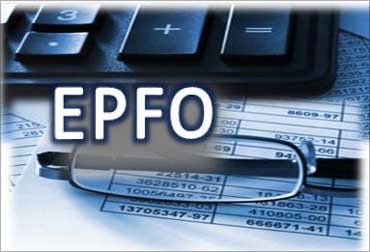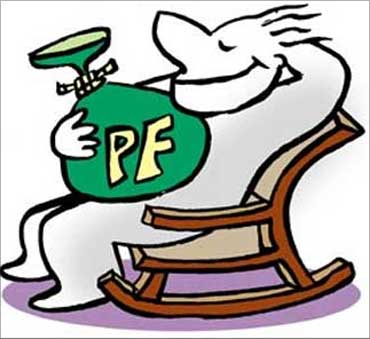
We normally hate any kind of deductions in our monthly salary slips -- either its income tax deduction, professional tax deduction or even an employees' provident fund (EPF) deduction.
Very few of us really know that this small EPF deduction each year can in reality make you a crorepati by the time you retire.
Encouraging fact is that this statement is applicable to even with those having modest salaries. There are many ifs and buts to achieve that, most notably resisting the temptation to withdraw money till retirement.
12 per cent of your basic salary that gets deducted as part of EPF account every month has a potential to make you a crorepati by the time you retire. Most of us are of view that investment is so small and interest rate offered is nothing special. Power of compounding clubbed with a matching contribution from your employer every month can do wonders for you.
Encouraging stats: 8.5 per cent interest earned on the EPF can help a person with a basic salary of Rs 25,000 a month accumulate a mammoth Rs 2.4 crore in 35 years. Sounds unbelievable.

Hard fact: A very few people are able to reach even 1 crore milestone in their careers.
Good news is that the initial draft of the Direct Tax Code has proposed that new contribution to EPF be taxed on withdrawal. However, the revised draft has made EPF fully tax exempt making it once again one of the best debt option available in the market.
Try not to touch your EPF account till you hang your boots. You may have to use it during acute emergencies but other than that avoid poking into this account while you are working. It's not uncommon of people to withdraw their EPF at the stage. Government discourages you to withdraw money as withdrawals from EPF within five years of joining are taxable. Early withdrawal don't allow power of compounding to come to play.

Lesson for everyone
Do not withdraw money from EPF while switching jobs, one should transfer the balance to the new account with the new employer. Remember, this do not happen automatically.
You need to fill 'Form 13' and deposit it with the EPFO. Make this one of your first TODOs things at new workplace as with course of time you will loose track of it and also get preoccupied at new job.
EPFO in addition is coming up with a software enabling online transfer of money from old account to new account. This will reduce both the paperwork and time taken for transaction.

Positives of EPF
Guaranteed returns: EPF is one of the safest debt instruments. Safety of principal and interest earned is very much there. Besides bring discipline in investing, it serves well to accumulate a corpus for retirement.
Tax exemption for sure: The contributions you make towards provident fund gets you a tax benefit under Section 80C, upto a maximum limit of Rs 1,00,000.
Interest rate fixed by government: The rate of interest on PF account is fixed eveny year during start of financial year by the government of India. The interest is for sure guaranteed and risk-free. The interest is credited to the members account on monthly running balance with effect from the last day in each year. The rate of interest is 9.5 per cent for the year 2010-11 as notified by the Government.
Out of 12 per cent (or 10 per cent as the case may be) of the employer's share of contribution, 8.33 per cent is to be remitted towards pension fund.

VPF option: In addition if you fund your debt portion lagging in your portfolio, you can add more through voluntary increases in your contribution (VPF).
Do not forget loans options against EPF: Your EPF balance can be used as a security for getting loans and thus makes your case strong for sanction of loan. Of course, it can also be utilised during acute emergency.
What if you do not withdraw and do not transfer?
Earlier keeping money in old EPF account was not much of a disadvantage as the amount continued to earn interest till time of withdrawal. But from April 2011, accounts which are inactive for more than three years will stop earning interest.
So there's a distinct disadvantage here apart from the fact that keeping multiple accounts can be a big pain. If accounts are located in different cities, it makes the process more cumbersome. Also a single account gives you a better idea of your current corpus.
Once UID number, which is currently being worked upon, comes into picture, EPF accounts will be portable. So in such a scenario there will be no need to switch funds. The new employer will make all contribution to this account and completely independent of workplace.
Source: Investment-Mantra.in







0 comments:
Post a Comment